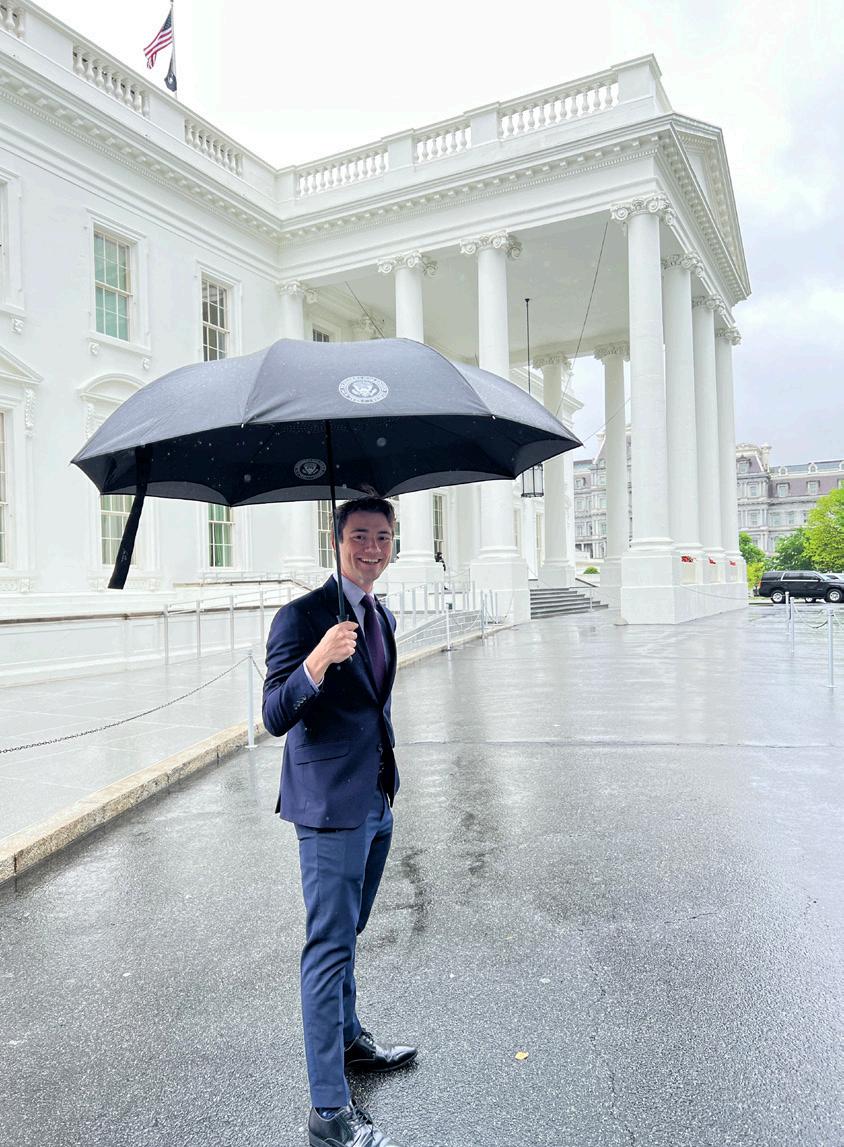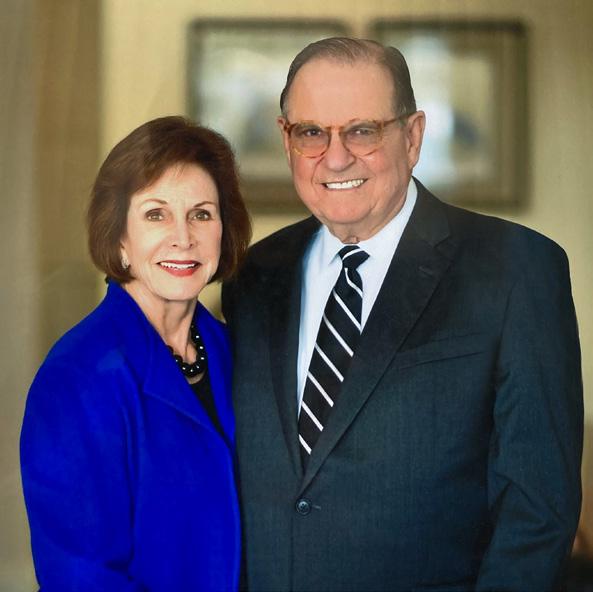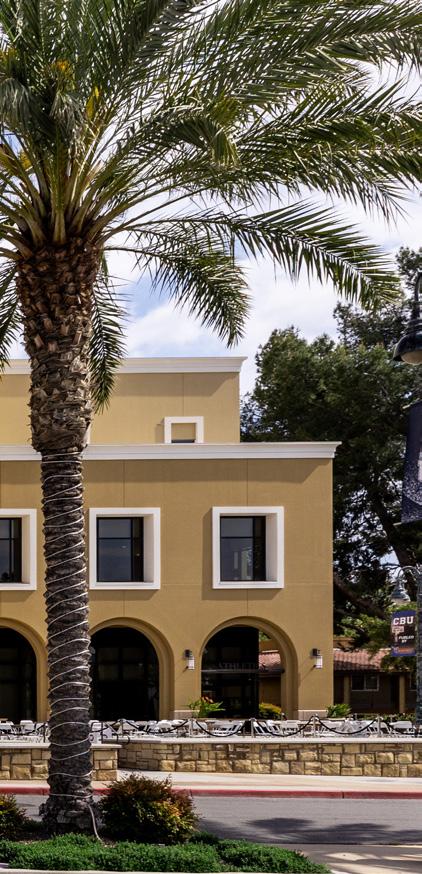
4 minute read
Interning at the White House
When Nathanael Hovda was a senior in high school, he started interning at the mayor’s office in Riverside. During his time at California Baptist University, he also interned at ExxonMobil and a consulting firm.
Then he went bigger. He interned at the White House.
The chemical engineering major worked in the Office of the Federal Chief Sustainability Officer from January to May 2022.
“It’s very surreal,” said Hovda, now a senior. “You walk in the big gate in front of the White House with your badge and go through a security checkpoint and you’re on the campus. You see the president as he walks from the Oval Office to his helicopter on the South Lawn.”
He met President Joe Biden, former President Barack Obama and various administration members. He took a photo with the Stanley Cup when the Tampa Bay Lightning hockey team came to the White House, and he went to the Easter Egg Roll held on the grounds.
Within the sustainability office are different teams: electricity, supply chain, vehicles, buildings and environmental justice, to name a few. Hovda was in the buildings team. He primarily worked on three projects: implementation strategy for infrastructure decarbonization; talking with tribal nations about environmental issues to form policy; and co-developing a federal electrification policy to reduce Scope 1 emissions, which come from direct burning of fossil fuels.
His role involved a lot of research. For instance, the decarbonization project was a result of an executive order to reduce fossil fuel use in buildings to net zero by 2045. Hovda researched state and local government policies that were effectively doing that, and worked with federal agencies to understand where current emissions were coming from.
“We have this goal, how do we get there? What are the very specific metrics that we need to be putting in place?” he said.
CBU prepared Hovda in various ways for this opportunity: His chemical engineering experience, both in the classroom and in the lab, helped as he worked with others in STEM. Understanding research was beneficial in realizing how academia plays a part in the recommendations that governments make.
Business classes helped because “everything comes down to money.” Public speaking courses taught him how to present in a way that is succinct and understandable.
After the five-month internship, Hovda took away several lessons from D.C. He learned how the government works. He also worked with people who reflected servant leadership and did their best to make policies effective.


“I think the lesson was leading by example,” Hovda said. “They were always willing to take time to work with other people, me and different stakeholders.”
On the more tangible side, he learned about prioritization. Hovda admits to being a perfectionist, but there was only so much time.
“We can only get so much done, so it’s up to you to figure out what you need to do. That was a quick wakeup call,” Hovda said. “It’s about figuring what needs to get done and creating a road map for that and figuring out how to do it.”
At CBU, Hovda has worked with the Lancer Media Group and with a CBU professor researching water contamination. He also is on the CBU Student Senate this year, its inaugural year, as chair and the engineering representative.
After graduation, Hovda will join the consulting firm McKinsey & Company in the Houston office. He may return to D.C. and work in some capacity on sustainability initiatives in government.
Working at the White House was special, even with the pressure and challenges, he said.
“I feel immensely privileged to share in a small part of that work. Indeed, amazing change can be made in D.C.,” Hovda said. “But I quickly learned the importance of the work being done across the country in state and local governments. That’s where the ‘policy rubber’ meets the road in our communities — and where we can be most involved.”
Top Takeaways
• Lead. Be a servant and uplifting example for the future.
• Prioritize. Create a road map for what needs to get done.
• Engage. Get involved in local and state governments.
California Baptist University celebrates historic $28.5 million gift
CBU students, alumni and friends can Lance Up! in a newly named events center — thanks to a generous gift of $28.5 million from real estate developer Dale Fowler and his wife, Ann. CBU named its 5,050-seat events center in their honor.

“We are extremely thankful to Dale and Ann for their generosity and support,” said Dr. Ronald L. Ellis, president of CBU. “This gift will be instrumental in our ability to continue delivering upon our mission to help students live God’s purpose in their lives. The Dale E. and Sarah Ann Fowler Events Center will be a reminder of how their generosity will impact CBU for generations to come.”

The Fowlers were introduced to CBU by their friends Billie Yeager and her late husband, Gene, who were early and significant supporters of CBU. Dale and Ann also have two grandchildren who graduated from CBU. Dale Fowler is an Orange County native and businessman, and the couple divide their time between residences in Massachusetts and Southern California.
“Supporting education is a priority for us,” Dale Fowler said. “It’s an honor to contribute to a university that makes a lasting impact on the lives of its students and in the areas they go on to work, serve and live. CBU is a remarkable Christian institution, and we are proud to support the important things happening on campus.”
The Fowlers have donated to CBU and other colleges in Southern California and Massachusetts. Their previous gifts to CBU supported endowed and general scholarships and the Endurance Fund, created to help the university through the pandemic. The couple’s latest gift — the largest one in CBU’s 73-year history — is not designated to a particular project, university officials said.

“Working with Dale and Ann over the years has been a blessing, and I am thrilled their legacy will be on full display at the Fowler Events Center,” said Paul J. Eldridge, J.D., vice president for University Advancement. “Friends like the Fowlers who invest in future generations unlock tremendous opportunities to enhance the student experience and impact student lives.
It is exciting to think of the many ways Dale and Ann’s gift will help future students reach their educational goals.”
The 5,050-seat events center opened in 2017. The 153,000-square-foot building provides space for Division I basketball games, weekly chapel services and commencement ceremonies, among other events.






